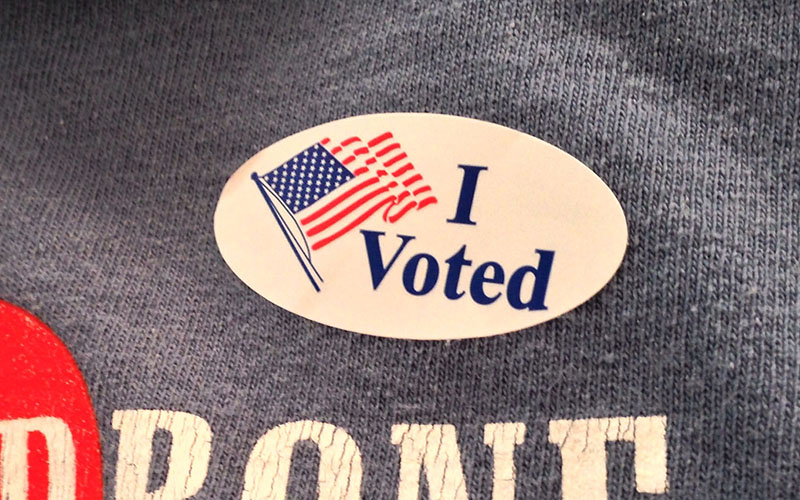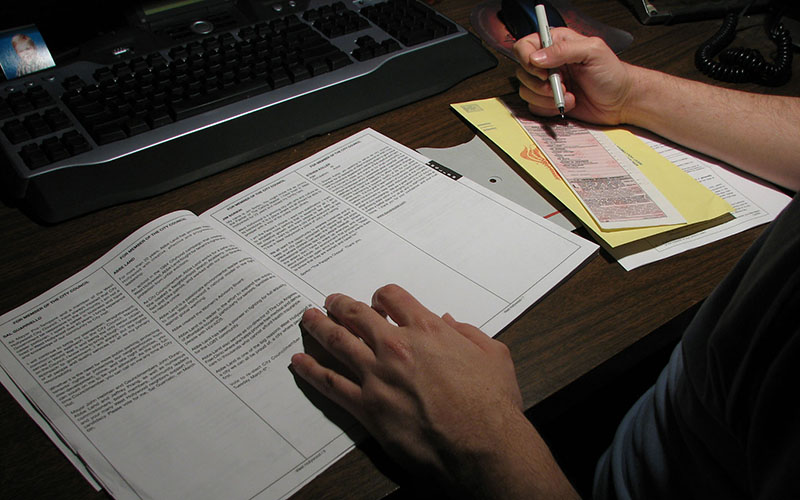
Two courts have now refused a request by Democratic groups to block an Arizona law that makes it a felony for anyone but a relative, caregiver or household member to collect another person’s early ballot. (Photo by H. Michael Karshis/Creative Commons)

Groups challenging Arizona’s ban on ballot collecting say it will harm minority and low-income groups that rely heavily on early voting and are less likely to have access to a post office or early voting facility. (Photo by Adrian Black/Creative Commons)
WASHINGTON – A federal appeals court handed Arizona Democrats a setback Friday, refusing to block a new state law that makes it a felony for anyone but a family member or caregiver to collect another person’s mail-in ballot.
A coalition of Democratic organizations had sued to block the law that they said would hurt minority and low-income groups’ ability to vote, since those groups rely heavily on early voting.
The ruling by a divided panel of the 9th U.S. Circuit Court of Appeals comes just days before the Nov. 8 election. It also comes as Democrats were preparing to file a separate suit charging state Republicans and presidential nominee Donald Trump’s campaign with a coordinated campaign of voter harassment and intimidation aimed at minority voters.
Friday’s ruling by the appeals court in the ballot-collection challenge upheld a lower court that refused to block the law before the election. The appellate panel said there was no clear error in the lower court’s refusal to put the law on hold.
See related story:
Democrats sue Trump, GOP, to stop what they call voter suppression tactics
“This case is not one in which ‘qualified voters might be turned away from the polls,'” said Judge Sandra Ikuta in the majority’s opinion. “Rather, it is one in which voters are precluded from giving their ballots to third-party ballot collectors and organizations must use an alternative means of mobilizing their voters.” But Chief Judge Sidney Thomas disagreed, saying in a strongly worded dissent that the “burden of the law on Arizona minority voters is substantial.” He said that early voting has become a critical means for minority voters to ensure their voices are heard in an election.
“There are many burdens and challenges faced in Arizona by Native Americans, Hispanics, African-Americans, the poor, and the infirm who do not have caregivers or family,” Thomas wrote. “With H.B. 2023, Arizona has added another: disenfranchisement.”
Supporters of the law, passed this year, said it is needed to protect the integrity of the voting process by preventing large-scale collection of ballots that could be subject to tampering or could subject voters to coercion. Under the law, only a household member, family member, caregiver or postal worker could handle another person’s early ballot.
Democratic groups have made ballot collection part of its get-out-the-vote strategy, the court said.
In April 2016, several Democratic groups challenged the law in a district court, claiming it violated the Voting Rights Act of 1965, as well as the 14th and 15th amendments. They said the state legislation “unjustifiably burdens the right to vote, and interferes with the freedom of association.”
Since the Arizona Democratic Party and affiliated organizations use ballot collecting as a means to ensure voters turn in their ballots, the law will require the party to divert resources “to more direct voter outreach to ensure that voters are either casting early ballots in person or mailing their ballots in on time.”
Plaintiffs included the Democratic National Committee, the Democratic Senatorial Campaign Committee, the state party and campaigns for the party’s presidential and Senate nominees, as well as representatives of minority groups.
But the court said the law merely limited a “more convenient” means of voting – something Thomas derided, noting that when 80 percent of voters vote absentee “the method has transcended convenience and become instead a practical necessity.”
Arizona Secretary of State Michele Reagan Monday welcomed the ruling that she said “appropriately recognized that nothing prevents civic organizations from encouraging, urging, or reminding people to vote.”
“Everyone eligible should vote,” Reagan said in an emailed statement. “And every Arizonan should have confidence in the outcome of the election. Making it illegal for anyone to collect anyone else’s ballot will significantly enhance the integrity of the outcome of our elections.”